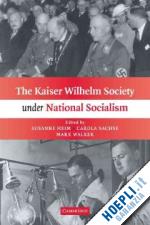1. The Kaiser Wilhelm Society during National Socialism Susanne Heim, Carola Sachse, and Mark Walker; Part I. Research and Personnel Policies: 2. A success story? Highlighting the history of the Kaiser Wilhelm Society's general administration in the Third Reich Rudiger Hachtmann; 3. No time to debate and ask questions - forced labor for science in the Kaiser Wilhelm Society, 1939–1945 Berhard Strebel and Jens-Christian Wagner; 4. Adolf Butenandt between science and politics: from the Weimar Republic to the Federal Republic of Germany Wolfgang Scheider; Part II. Racial Research: 5. Brain research and the murder of the sick: the Kaiser Wilhelm Institute for Brain Research, 1937–1945 Hans-Walter Schmuhl; 6. Two hundred blood samples from Auschwitz: a Nobel Laureate and the link to Auschwitz Achim Trunk; 7. Racial purity, stable genes, and sex difference: gender in the making of genetic concepts Richard Goldschmidt and Fritz Lenz, 1916–1936 Helga Satzinger; Part III. 'Eastern Research,' 'Living Space,' Breeding Research: 8. Kog-Sagyz - a vital war reserve Susanne Heim; 9. Raw and advanced materials for an autarkic Germany: textile research in the Kaiser Wilhelm Society Gunther Luxbacher; 10. Political networking and scientific modernization: botanical research at the KWI for Biology and its place in national social science policy Bernd Gausemeier; Part IV. Military Research: 11. Ideology, armaments and resources: the Kaiser Wilhelm Institute for Metal Research and the 'German metals' 1933–1945 Helmut Maier; 12. Calculation, measurement, and leadership: war research at the Kaiser Wilhelm Institute for Fluid Dynamics, 1937–1945 Moritz Epple; 13. Chemical weapons research in National Socialism: the collaboration of the Kaiser Wilhelm Institutes with the military and industry Florian Schmaltz; 14. Nuclear weapons and reactor research at the Kaiser Wilhelm Institute for Physics Mark Walker; 15. Whitewash culture: how the Kaiser Wilhelm/Max Planck Society dealt with the Nazi past Carola Sachse; 16. The predecessor: the uneasy rapprochement between Carl Neuberg and Adolf Butenandt after 1945 Michael Schuring.











